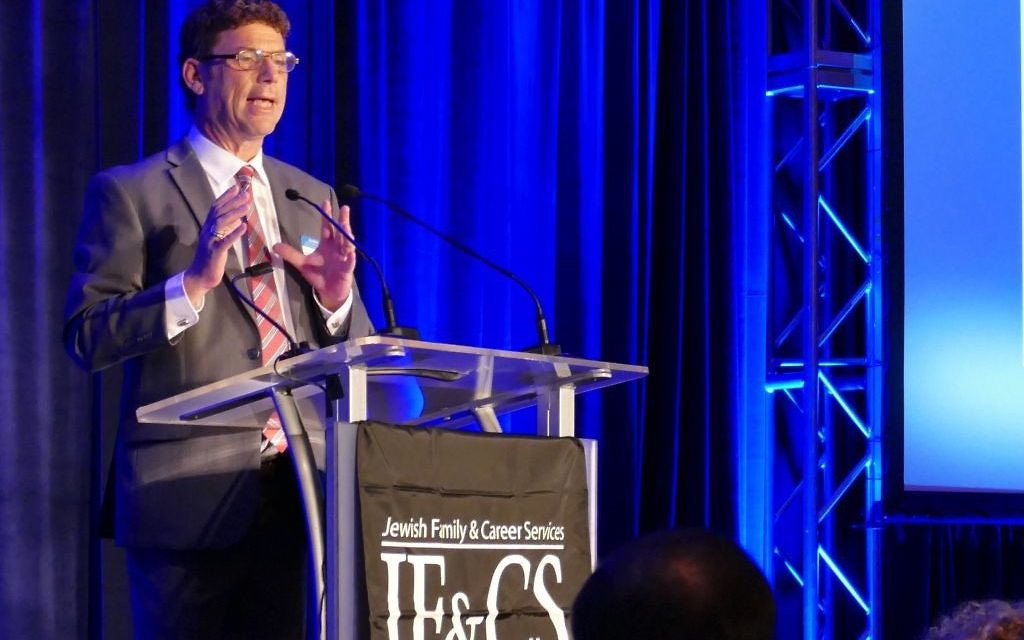HAMSA, Eric Miller Split
Eric Miller has been let go as the program coordinator for the JF&CS HAMSA program, effective Wednesday, Aug. 9.

Jewish Family & Career Services has let Eric Miller go as the program coordinator for HAMSA, effective Wednesday, Aug. 9.
The decision came after three years in which Helping Atlantans Manage Substance Abuse, which provides addiction education and services, expanded its profile and impact in the Jewish community under Miller’s leadership.
Miller was the public face of the program. On Aug. 1, five days after HAMSA committee members were notified that he was leaving, Miller was featured at the top of the Jewish Federation of Greater Atlanta’s weekly Federation Five e-newsletter, which called HAMSA “an important community resource for a community problem.”
Get The AJT Newsletter by email and never miss our top stories Free Sign Up
“All of our programs at JF&CS are bigger than one person,” CEO Rick Aranson said. “That doesn’t mean we don’t value the contributions of all who came before. … We care deeply about Eric.”
Aranson and Chief Program Officer Faye Dresner praised the success of Miller and his predecessor, Erica Katz, in building demand for HAMSA’s educational and clinical services since its launch six years ago.
“I had a passion. They gave me the opportunity to develop the rest,” Miller said in an interview.
Anonymity is a cornerstone of the recovery process. But to pull back the shroud of secrecy and shame covering addiction in the Jewish community, Miller shared his battle with addiction and commitment to recovery.
“JF&CS offered me an opportunity that let me learn, develop skills and grow,” Miller said. “I have great gratitude for what JF&CS did for me personally and professionally and for the impact we have been able to have on the community.”
He said the monthly sober Shabbats are planned through October, but HAMSA will need operational leadership.
Miller led HAMSA to a tipping point at which it needs to shift from the startup phase to an operational phase, Aranson said. JF&CS leadership decided that growth phase requires a high-level, strategic program manager instead of a coordinator.
“We’re really just scratching the surface of the problem in this town. There’s an opportunity for a bigger impact,” he said.
The program is developing from proof of concept to a sustainable approach that, like other JF&CS programs, emphasizes what the agency does well and finds partners that are strong in related areas to have the maximum impact.
The HAMSA committee of lay leaders, chaired by Alison Lukacsko, is meeting with JF&CS executives the next few weeks to develop a strategic plan for the program while simultaneously trying to hire the program manager. The job was posted on Work for Good and other online boards Thursday, Aug. 4.
“It’s extremely important to set a vision going forward,” Dresner said. JF&CS is looking for someone who can maintain a high-level view to develop strategy, drive implementation and build partnerships.
Those partners could be Jewish or non-Jewish organizations, including private Jewish recovery programs being launched in Atlanta.
The goal is to create a model that can be scaled and replicated without building infrastructure, Dresner said. No one in the nation has developed a successful approach for integrating Jewish content into recovery programs, Dresner said. “The ideal is a seamless web of services.”
HAMSA has outreach and clinical sides. Thanks to the work of Miller and Katz, HAMSA has connected with schools and other Jewish organizations, and the outreach side is stable, Aranson said. So he thinks the agency will need to invest more on the clinical side.
HAMSA’s one full-time clinician has a full counseling caseload for people in recovery and their families, said Dan Arnold, the JF&CS director of clinical services. Other counselors with addiction experience can help.
A program assistant is joining HAMSA and will handle some of the outreach and education.
“The demand continues to be very real and increasing. Schools are asking for our services,” Arnold said. “We want to be able to meet the needs of the community.”
Money is a key part of meeting those needs. The Marcus Foundation continues to support HAMSA, but Aranson said JF&CS needs to diversify HAMSA’s funding with donations from other foundations and from individuals.
Meanwhile, Miller said he is still “looking to have impact,” specifically in Jewish recovery. Miller said he wants to “be in the trenches, helping people in the Jewish community struggling with addiction and their families.”
He is also drawn to criminal justice reform to assist those in need with a fair application of the law and to stop treating addiction as a crime. He expressed an interest in college recovery, referencing a new program at Kennesaw State University.
“I think I’ve had an important voice and great impact over the last three years because it’s a program that is so necessary,” Miller said. He added that HAMSA is larger than any one person. “If there is one thing I’ve learned, it’s that this is way, way bigger than me.”
Miller said the program is vital to the Jewish community. “It is my great hope that what they continue to build is better, stronger and ultimately sustainable. And successful. I want this program to be a great success.



comments